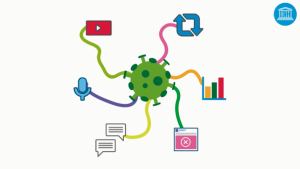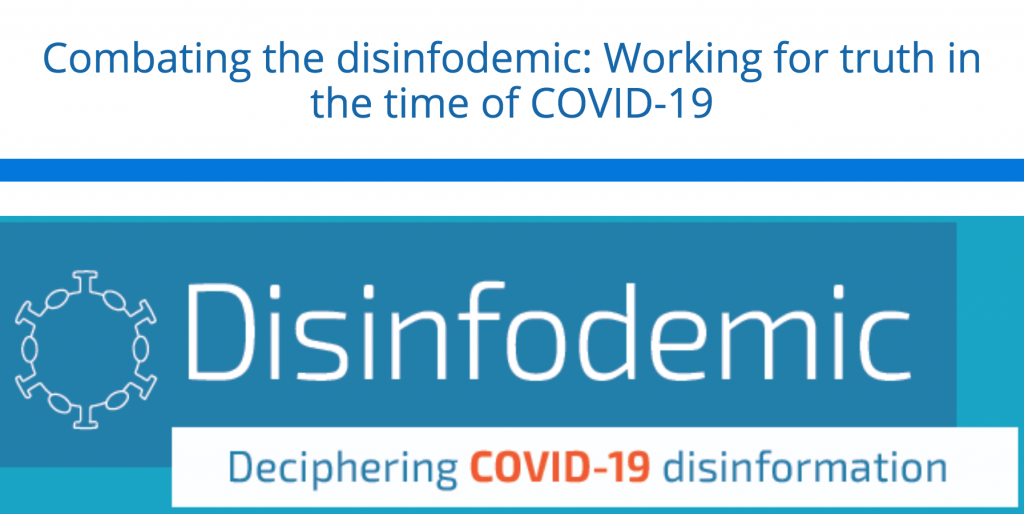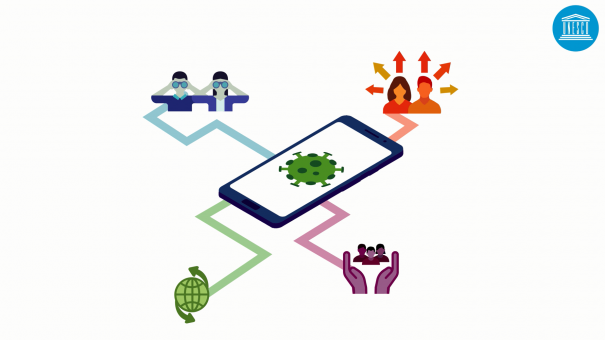Two members of the Centre for Freedom of the Media research team at the University of Sheffield, Julie Posetti (who is Global Director of Research at the International Center for Journalists) and Kalina Bontcheva (who is Head of the Natural Language Processing Research Group at the Department of Computer Science), have written two new UNESCO Policy Briefs that assess the worrying extent of misinformation that has accompanied the COVID-19 crisis. The research was produced in partnership with the International Center for Journalists (ICFJ).
At a time when the ability of citizens to make evidence-based decisions about reality is absolutely crucial, the so-called ‘disinfodemic’ of falsehoods, fabrications and misinformation’ is obstructing access to trustworthy sources and reliable information leading to ‘confusion about life-saving personal and policy choices, impacting nearly every person on the planet and the global economy’, the reports show.[1]

The research demonstrates that ‘fears are growing that this phenomenon is putting lives at risk, prompting some with symptoms to try unproven remedies in the hope of “curing’ themselves’ with consequences that are possibly even ‘more deadly than disinformation about other subjects, such as politics and democracy’.[2]
The research identifies nine themes describing the content of the coronavirus disinformation. These include false statements on the origins and spread of the disease through to those on symptoms and treatments, and include politicised information as well as attempts to attack and discredit journalists and credible news sources. Dr Posetti and Professor Bontcheva also detected four key formats used to disseminate disinformation: highly emotive narrative constructs and memes; fabricated, fraudulently altered, or decontextualized images and videos; fake websites, data sets and sources; and disinformation infiltrators and orchestrated campaigns.
These attempts to distort the public’s understanding of the pandemic and its effects gain traction by inserting “…falsehoods into people’s consciousness by focusing on beliefs rather than reason, and feelings instead of deduction. They rely on prejudices, polarisation and identity politics, as well as credulity, cynicism and individuals’ search for simple sense-making in the face of great complexity and change”.
The reports also examine the effectiveness of various responses that have been used in the attempt to manage and control the ‘disinfodemic’, by ‘cutting the supply and generation of false content; limiting its transmission; inoculating receivers against effects; and preventing onward circulation’. The researchers found that these remedies may actually harm rights to freedom of expression and access to information and privacy.

In fact, “…restrictive responses to curtail COVID-19 disinformation could (…) hurt the role of free and quality journalism in its ability to counter the self-same disinfodemic”. Examples of such restrictive measures include the intentional or unintentional criminalising of critical journalism through so called ‘fake news’ laws. The report says it is essential that the responses of policy-makes and others to the ‘disinfodemic’ should take international human rights standards into account, and consider the proportionality and necessity of proposed interventions in relation to limiting freedom of expression to ensure that they do not “…hobble the work of journalists and others engaged in vital research, investigation and storytelling about the pandemic.”
Guy Berger, the Director for Policies and Strategies regarding Communication and Information at UNESCO, commented that free and professional journalism should be considered “an ally in the fight against disinformation, especially because the news media works openly in the public sphere, whereas much disinformation is under-the-radar, on social messaging apps.” Indeed, “as a power against disinformation even when it publicises verified information and informed opinion that annoys those in power (…) the media deserves to be recognised and supported by governments as an essential service at this time.”
This understanding of journalism as providing a counterforce to disinformation and as defending a commitment to the public’s right to know and the provision of authoritative facts is one of several key areas of research at the Centre for Freedom of the Media (CFOM). Other areas include a re-evaluation of public service journalism as a form of civil resistance confronting antagonistic state and market forces, news as a form of civil norm building in post civil war settings, the development of advanced data tools to monitor attacks on journalists, online harassment of female journalists and understanding the link between enhancing media literacy among the public and ensuring that journalists can carry out their work without risk to their personal safety. To contribute towards securing the important role that free and independent journalism plays in facilitating the public’s right to information CFOM also hosts a global Journalism Safety Research Network, which promotes the development of spaces for research co-operation and innovation to address the complex issues associated with journalism safety.
The two UNESCO Policy Briefs are free to download here:
Deciphering COVID-19 disinformation. Policy Brief 1
https://en.unesco.org/sites/default/files/disinfodemic_deciphering_covid19_disinformation.pdf
Dissecting responses to COVID-19 disinformation. Policy Brief 2
https://en.unesco.org/sites/default/files/disinfodemic_dissecting_responses_covid19_disinformation.pdf
See also:
UN-ICFJ Research Examines COVID-19 Disinformation (explainer of Policy Brief 1)
https://www.icfj.org/news/un-icfj-research-examines-covid-19-disinformation
UN-ICFJ Research Highlights Journalism’s Critical Role in Fighting COVID-19 Disinformation (explainer of Policy Brief 2)
https://www.icfj.org/news/un-icfj-research-highlights-journalisms-critical-role-fighting-covid-19-disinformation
New UNESCO Policy Briefs launched assessing the COVID-19 ‘Disinfodemic’
https://en.unesco.org/news/new-unesco-policy-briefs-launched-assessing-covid-19-disinfodemic-0
During this coronavirus pandemic, ‘fake news’ is putting lives at risk: UNESCO
https://news.un.org/en/story/2020/04/1061592
For more information on UNESCO’s work on COVID-19 see:
https://en.unesco.org/covid19
For more information on CFOM’s research projects see:
https://cfom.org.uk/
[1] https://en.unesco.org/news/new-unesco-policy-briefs-launched-assessing-covid-19-disinfodemic-0
[2] https://news.un.org/en/story/2020/04/1061592
Image copyright @UNESCO available under Open License CC BY SA 3.0 IGO

